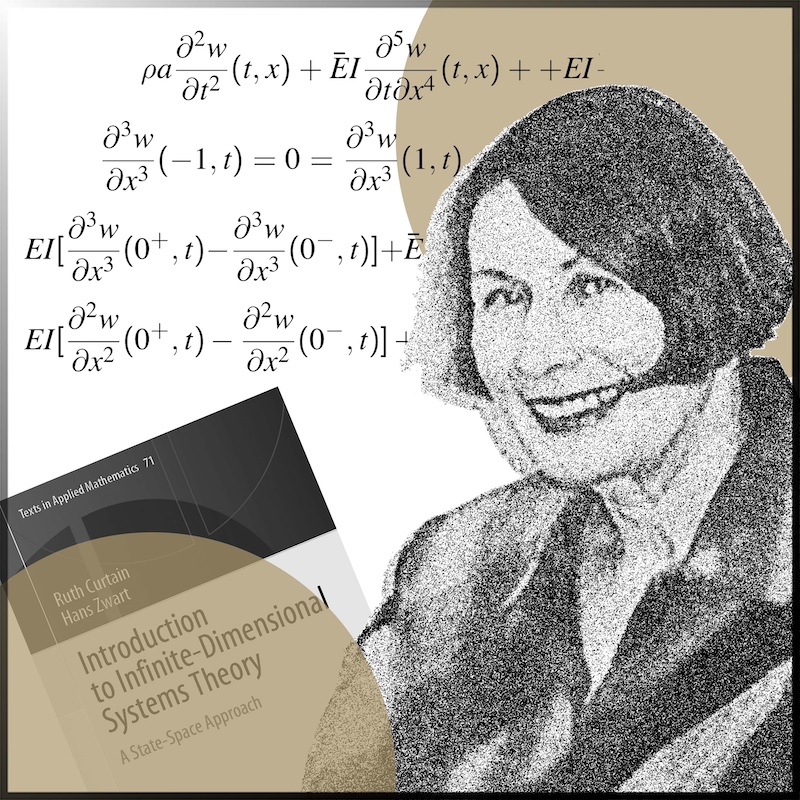Ruth Curtain

Ruth Curtain (1941-2018)
Australian mathematician and researcher in infinite dimensional systems theory
Affiliation: University of Groningen (Netherlands)
“When the positions are attractive and allow a wide spectrum of scientific endeavour, women most certainly do apply.” (Ruth Curtain, Margo Brouns, and Jeanine Olsen)
Ruth Curtain was an Australian mathematician and control engineer. Her research significantly advanced control theory by extending the theory developed for finite-dimensional systems to infinite-dimensional systems. She was also the coordinator of the Rosalind Franklin Fellowship – a successful initiative to increase the number of women in permanent scientific positions at the University of Groningen.
A pioneer in control of infinite-dimensional systems
Ruth Curtain is renowned for having significantly contributed to the research fields of control theory and infinite-dimensional systems. Infinite-dimensional systems are a particular class of dynamical systems where the system cannot be fully described using a finite number of state variables. Instead, it requires an infinite number of state variables or functions, often described by partial differential equations, delay differential equations, or functional differential equations. Ruth Curtain’s research extended the principles of finite-dimensional systems into spaces with infinitely many dimensions and significantly advanced the understanding of controlling and stabilizing these infinite-dimensional spaces, ensuring that such systems behave in a predictable and stable manner. Her theoretical work has several applications in various real-world problems, such as fluid dynamics, population dynamics, and engineering.
Her seminal book, "Introduction to Infinite-Dimensional Systems Theory," co-authored with Hans Zwart, is foundational for providing a comprehensive framework for understanding and working with infinite-dimensional systems. It quickly became a standard reference within the field.
Coordinator of a successful initiative to increase the number of women in permanent scientific positions
Ruth Curtain promoted women in science, primarily through her position as a coordinator of the Rosalind Franklin Fellowship program at Groningen University. The program was initiated by the Faculty of Science and Engineering in 2002 and was designed to attract and promote the careers of outstanding female scientists and scholars to enhance diversity and increase the number of women in permanent scientific positions at the University. It is named after Rosalind Franklin, best known for her work on the X-ray diffraction images of DNA while at King's College London, which led to the discovery of the DNA double helix. According to the webpage of Groningen University, the initiative has been very successful, and more than 120 fellows have been offered permanent positions as a result of the program.
Background and life
First mathematics…
Ruth Curtain was born in Melbourne, Australia, in 1941. She was the eldest of four siblings. She grew up in a standard working-class family, her father being a painter and her mother a housewife. At that time, girls typically left school at 14 to start a job. However, having a mother who believed in education and struggled for her daughters to be able to continue their studies, Ruth and her three sisters got the chance to go to school even after the age of 14. Ruth Curtain once said, "My mother was a great fighter" referring to her struggle for her daughters’ education.
In high school, mathematics was regarded as unsuitable for girls, spurring Ruth Curtain to do her utmost. She finished first in her class. She then went on to university on a scholarship, graduating and continuing with a master's degree on a topic from algebra, a subject that only interested her marginally.
… then, the control theory
During her studies, she came across the new research field of control theory, which caught her interest. Since control theory could not be studied in Australia, she decided to go to the U.S. In 1969, she obtained her PhD in stochastic partial differential equations at Brown University. She then left for a postdoc at Purdue University and then on to the newly founded Control Theory Centre of the University of Warwick in the U.K. She found the place very interesting, but there were few opportunities for advancement. When offered a position in mathematics at the University of Groningen, she thus accepted. Initially, she was only supposed to stay for a few years but remained until retirement. She said it was mainly due to the active research group at the University but also because she liked the city and the attitude of the Groningens.
Challenging the students
Ruth Curtain is known always to have given her students challenging topics, never shying away from supporting and helping them. Despite being an advocate for women in science and more equitable hiring in the university system, all her PhD students were men. In an interview, she questioned herself as a role model for young women since she was never married or had a family.
Numerous papers and several books and awards
Apart from compiling her research into numerous papers, Ruth Curtain is also the author of three books on control theory. She has served as associate editor of several international journals in mathematics and control theory, including Systems and Control Letters, Automatica, Mathematics of Control, Signals and Systems, and the Journal of Mathematical Systems, Estimation and Control, and as editor of Automatica.
She was elected a Fellow of the Institute of Electrical and Electronics Engineers (IEEE) for her contributions to the control theory of stochastic systems and infinite-dimensional systems.
In 2012, she received the W.T. and Idalia Reid Prize from the Society for Industrial and Applied Mathematics (SIAM). The prize is awarded for research in, or other contributions to, the broadly defined areas of differential equations and control theory. Ruth Curtain was awarded the prize for “her fundamental contributions to the theory of infinite dimensional systems and the control of systems governed by partial and delay differential equations”.
